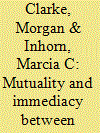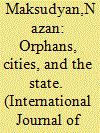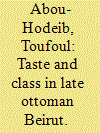|
|
|
Sort Order |
|
|
|
Items / Page
|
|
|
|
|
|
|
| Srl | Item |
| 1 |
ID:
106947


|
|
|
|
|
| Publication |
2011.
|
| Summary/Abstract |
Recently, there have been many compelling new theories of the emergence of an "Islamic public sphere." Few studies, however, have examined the role of literary writing in contributing to its emergence, even though such writing was critical to the intellectual elite's shift toward Islamic subjects in mid-20th century Egypt. In addition, little of this scholarship has examined the gendered nature of this public sphere in any depth, though gendered rights, roles, and responsibilities were among the most hotly contested debates in public discourses on religion. This article looks at how literary writing not only shaped particular interpretations of gendered relationships in Islam but also developed hermeneutical techniques for reinterpreting religious sources. It specifically examines the work of Egyptian literary scholar and Islamic thinker Bint al-Shati? and how her writings helped define the nature of the family, gender relations, and the private sphere in Islamic public discourse.
|
|
|
|
|
|
|
|
|
|
|
|
|
|
|
|
| 2 |
ID:
106951


|
|
|
| 3 |
ID:
106946


|
|
|
|
|
| Publication |
2011.
|
| Summary/Abstract |
This article concerns the dominant institution of religious authority within modern Usuli Twelver Shi?i Islam: the marja?iyya. The most senior clerics serve as "sources of emulation" (mara-ji? al-taqli-d), informing the moral conduct of their lay "imitators" (muqallidu-n). Despite the importance of this relationship, academic writing on what we call its "affective" qualities, especially from lay perspectives, is limited. We provide ethnographic data from anthropological research into Islamic medical ethics in Lebanon. Interviews in 2003 with infertile Shi?i patients who were considering controversial assisted reproductive technologies revealed rare insights into which authorities they followed and in what numbers and how this relationship was experienced and drawn upon by those in need. We compare the very different relationships inspired by the two authorities most cited in our study: the late Beirut-based Ayatollah Fadlallah; and the Iranian Ayatollah Khamina?i, Hizbullah's patron. From his local base, Fadlallah offered a vivid and responsive persona of a qualitatively distinct type.
|
|
|
|
|
|
|
|
|
|
|
|
|
|
|
|
| 4 |
ID:
106950


|
|
|
|
|
| Publication |
2011.
|
| Summary/Abstract |
This article examines the relationship between state and society in the Ottoman Empire during the 17th and 18th centuries by examining concepts and practices of privacy. Fatwas of Ottoman jurists reveal certain principles ordering the division of urban areas into public and private spaces. The article explores their application during the rebuilding of Damascus after its devastation by an earthquake in 1759. Archival sources disclose the priorities that guided the state in reconstructing a ruined provincial capital: religious values; a concern for the inhabitants' well-being; and, rather prominently, an intent to maintain a dichotomy between public and private. In this the Ottomans were different from their contemporary European counterparts, who often took advantage of major disasters to reshape relations between rulers and subjects. This divergence is demonstrated in this article by comparing post-1759 Damascus with London after the Great Fire of 1666 and Lisbon after the 1755 earthquake.
|
|
|
|
|
|
|
|
|
|
|
|
|
|
|
|
| 5 |
ID:
106949


|
|
|
|
|
| Publication |
2011.
|
| Summary/Abstract |
This article deals with the material aspects of the late Ottoman home in Beirut, focusing on the notion of taste (dhawq) and its role in constructing class boundaries. It looks at how intellectuals used taste to articulate a prescriptive middle-class domesticity revolving around the woman as manager of the house and privileging moderation and authenticity in consumption habits. Rather than take such tastes as representative of actual consumption habits of an emerging middle class, and arguing for an approach that goes beyond taste as a construct, the article investigates the potentiality of new objects for subverting the existing social order. Based on a marital-conflict case brought to the Hanafi court, the article explores how one such object, a phonograph, opened interpretive possibilities in the gendered rigidity of court procedures.
|
|
|
|
|
|
|
|
|
|
|
|
|
|
|
|
| 6 |
ID:
106948


|
|
|
|
|
| Publication |
2011.
|
| Summary/Abstract |
Nearly one-third of Turkey's official preaching workforce are women. Their numbers have risen considerably over the past two decades, fueled by an unforeseen feminization of higher religious education as well as the Directorate of Religious Affairs' attempts to redress its historical gender imbalances. Created in the early Turkish Republic, the Directorate is also historically embedded in (re)defining the appropriate domains and formations of religion, and the female preachers it now employs navigate people's potent fears rooted in memories of this fraught past. In the various neighborhoods of Istanbul, these preachers attempt to overcome conservative Muslims' cautious ambivalence toward the interpretative and disciplinary powers of a secular state as well as assertive secularists' discomfort and suspicion over increasingly visible manifestations of religiosity. Thus, the activities of state-sponsored female preachers are inescapably intertwined with the contestation of religious domains and authority in the secular Republic of Turkey and demonstrate an intricate interplay between the politics of religion, gender, and secularism in contemporary Turkish society.
|
|
|
|
|
|
|
|
|
|
|
|
|
|
|
|
|
|
|
|
|